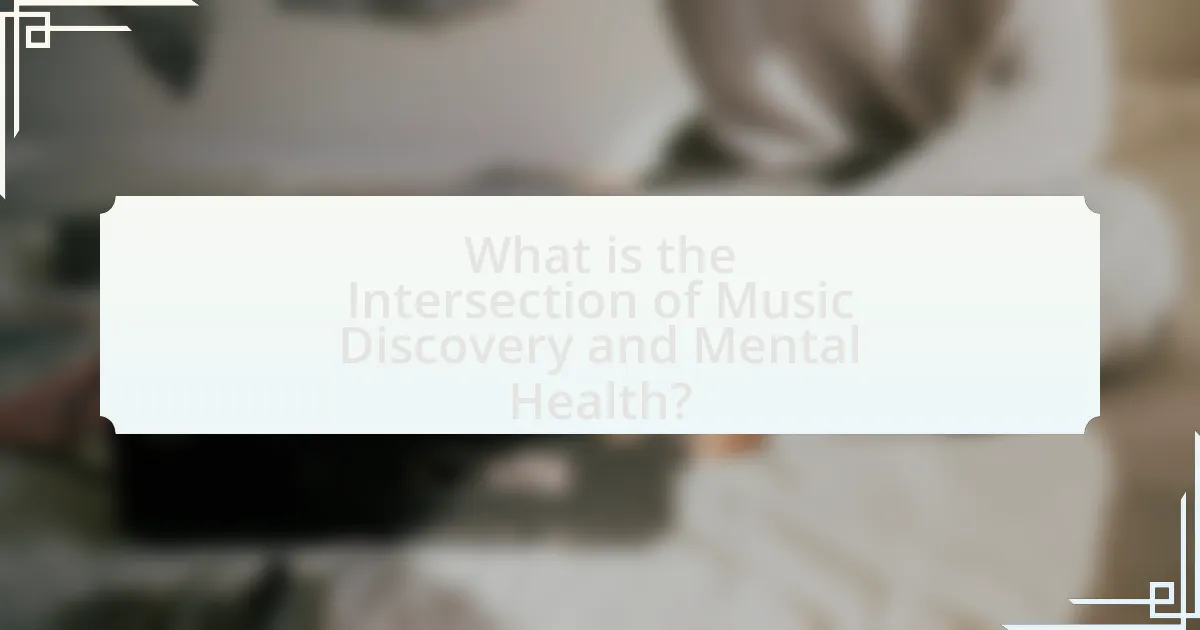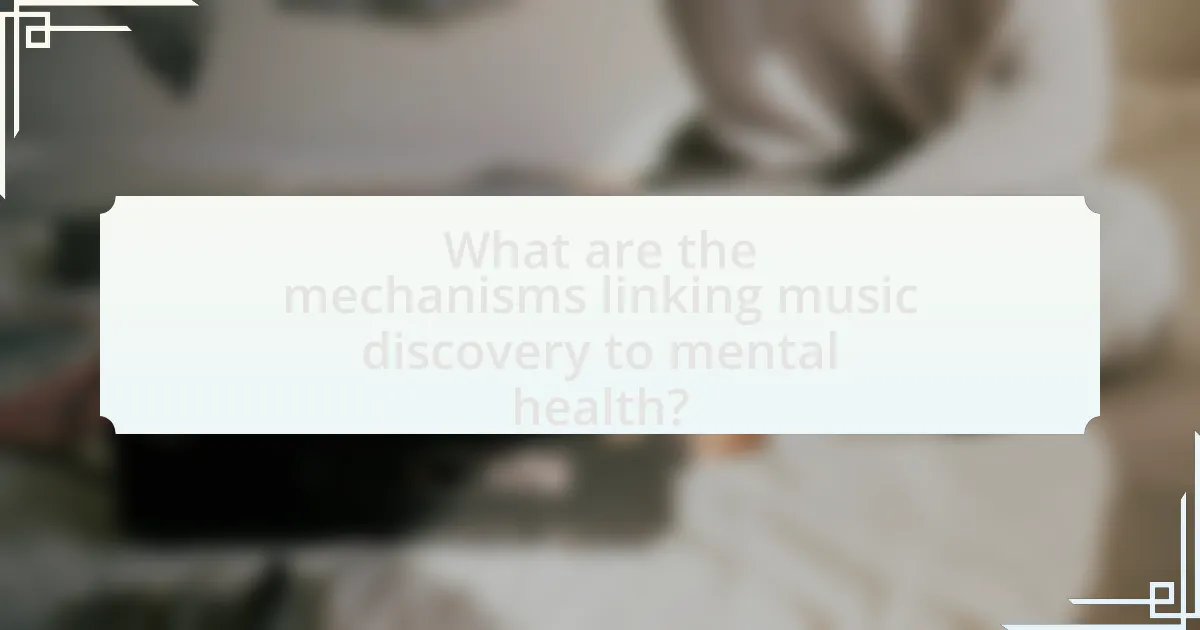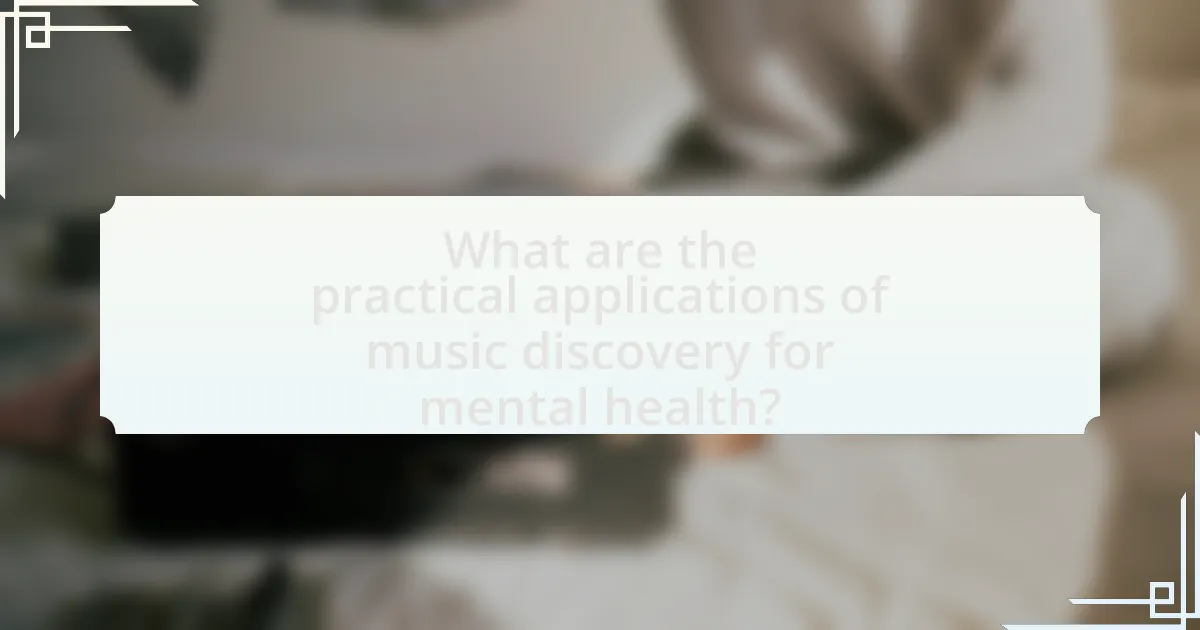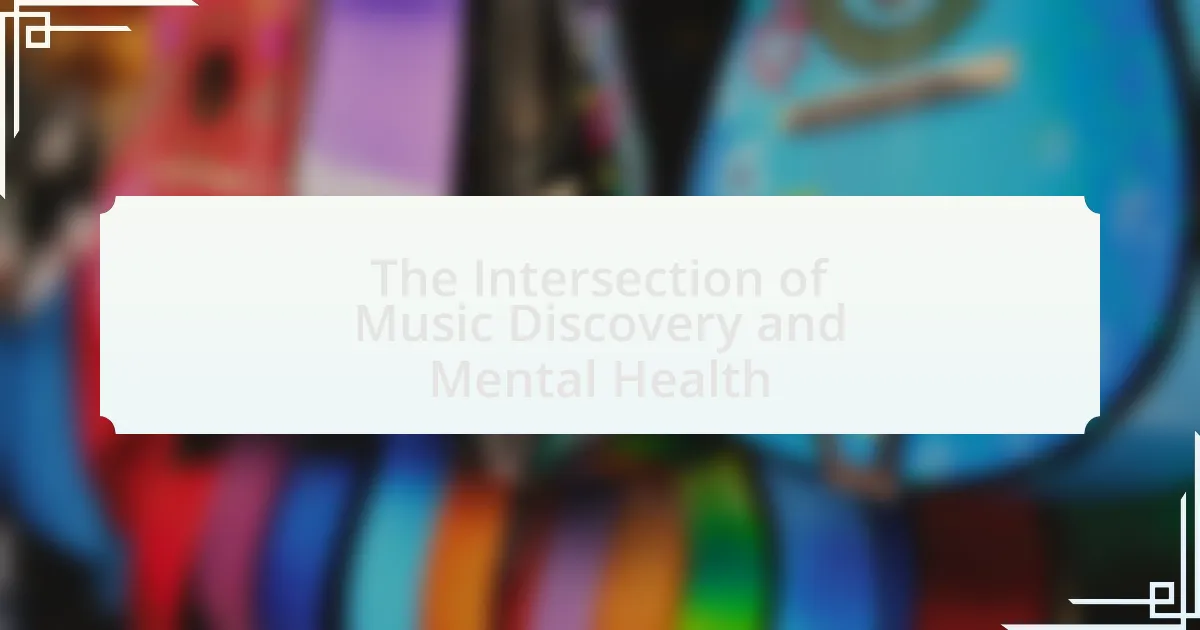The article explores the intersection of music discovery and mental health, highlighting the therapeutic potential of music to enhance emotional well-being and facilitate personal expression. It discusses how music discovery platforms can provide personalized playlists that cater to users’ emotional states, thereby reducing symptoms of anxiety and depression. The article also examines the role of music in emotional regulation, social connections, and cognitive engagement, while addressing potential risks associated with music consumption. Additionally, it outlines practical applications for using music as a therapeutic tool and offers strategies for effective music selection to improve mental health outcomes.

What is the Intersection of Music Discovery and Mental Health?
The intersection of music discovery and mental health lies in the therapeutic potential of music to enhance emotional well-being and facilitate personal expression. Research indicates that engaging with music can reduce symptoms of anxiety and depression, as evidenced by a study published in the Journal of Positive Psychology, which found that participants who actively discovered and listened to new music reported improved mood and increased feelings of happiness. Additionally, music discovery platforms can provide users with personalized playlists that cater to their emotional states, further supporting mental health by promoting relaxation and emotional regulation.
How do music discovery platforms influence mental health?
Music discovery platforms influence mental health by providing personalized music recommendations that can enhance mood and emotional well-being. Research indicates that listening to music tailored to individual preferences can lead to reductions in anxiety and depression symptoms. For instance, a study published in the Journal of Positive Psychology found that participants who engaged with music that resonated with their emotional state reported significant improvements in their overall mood and mental health. Additionally, these platforms foster social connections through shared musical experiences, which can combat feelings of loneliness and isolation, further supporting mental health.
What role does music play in emotional regulation?
Music plays a significant role in emotional regulation by influencing mood and emotional states. Research indicates that listening to music can evoke specific emotions, helping individuals manage feelings such as sadness, anxiety, or stress. For instance, a study published in the journal “Psychology of Music” by Thoma et al. (2013) found that participants reported improved mood and reduced stress levels after engaging with music. This demonstrates that music serves as a tool for emotional expression and coping, allowing individuals to process their feelings and enhance their emotional well-being.
How can music discovery enhance mood and well-being?
Music discovery can enhance mood and well-being by providing individuals with new auditory experiences that can evoke positive emotions and reduce stress. Engaging with diverse music genres and artists allows listeners to find songs that resonate with their personal feelings, leading to improved emotional regulation. Research indicates that listening to music can trigger the release of dopamine, a neurotransmitter associated with pleasure and reward, thereby uplifting mood. A study published in the Journal of Positive Psychology found that participants who actively engaged in music discovery reported higher levels of happiness and life satisfaction. This evidence supports the notion that exploring new music can serve as a valuable tool for enhancing mental health and overall well-being.
Why is understanding this intersection important?
Understanding the intersection of music discovery and mental health is important because it reveals how music can influence emotional well-being and therapeutic practices. Research indicates that music can serve as a powerful tool for emotional expression and regulation, which is crucial for mental health management. For instance, a study published in the Journal of Music Therapy found that music interventions significantly reduced anxiety and depression symptoms in participants, highlighting the therapeutic potential of music in mental health contexts. This understanding can lead to more effective mental health strategies that incorporate music as a means of support and healing.
What are the potential risks of music consumption on mental health?
Music consumption can pose several potential risks to mental health, including the exacerbation of negative emotions and the reinforcement of harmful behaviors. Research indicates that listening to music with negative themes can lead to increased feelings of sadness, anxiety, or anger, particularly in vulnerable individuals. For instance, a study published in the Journal of Music Therapy found that individuals who frequently listened to melancholic music reported higher levels of depressive symptoms. Additionally, music that glorifies substance abuse or violence can normalize these behaviors, potentially leading to increased risk-taking and unhealthy coping mechanisms. Therefore, while music can be therapeutic, it also carries risks that can adversely affect mental health.
How can music be used as a therapeutic tool?
Music can be used as a therapeutic tool by facilitating emotional expression, reducing anxiety, and enhancing cognitive function. Research indicates that music therapy can significantly lower stress levels and improve mood in individuals with mental health issues. For example, a study published in the Journal of Music Therapy found that participants who engaged in music therapy reported a 50% reduction in anxiety symptoms. Additionally, music can stimulate brain areas associated with memory and emotion, making it effective for conditions like depression and PTSD. Thus, music serves as a versatile medium for promoting mental well-being and emotional healing.

What are the mechanisms linking music discovery to mental health?
Music discovery positively influences mental health through mechanisms such as emotional regulation, social connection, and cognitive engagement. Emotional regulation occurs as individuals use music to process feelings, leading to reduced anxiety and improved mood. Research indicates that listening to preferred music can elevate dopamine levels, enhancing feelings of pleasure and motivation. Social connection is fostered through shared musical experiences, which can strengthen relationships and provide a sense of belonging, both crucial for mental well-being. Cognitive engagement arises when individuals explore new genres or artists, stimulating curiosity and creativity, which can combat feelings of stagnation or boredom. Studies, such as those published in the Journal of Positive Psychology, demonstrate that engaging with music can lead to significant improvements in overall mental health outcomes.
How does exposure to new music affect emotional states?
Exposure to new music can significantly alter emotional states by eliciting various feelings such as joy, nostalgia, or even sadness. Research indicates that listening to unfamiliar music can stimulate the brain’s reward system, leading to the release of dopamine, a neurotransmitter associated with pleasure and motivation. A study published in the journal “Psychological Science” by Salimpoor et al. (2011) found that participants experienced increased levels of enjoyment and emotional arousal when exposed to new musical pieces, demonstrating that novelty in music can enhance emotional experiences. Additionally, new music can serve as a tool for emotional regulation, allowing individuals to process their feelings and improve their mood.
What psychological theories explain the impact of music on mood?
Psychological theories explaining the impact of music on mood include the Arousal Theory, the Cognitive Appraisal Theory, and the Social Identity Theory. Arousal Theory posits that music can evoke emotional responses by altering physiological arousal levels, which directly influences mood. For instance, fast-paced music can increase arousal and enhance feelings of excitement, while slow music may promote relaxation and calmness. Cognitive Appraisal Theory suggests that individuals interpret and evaluate music based on personal experiences and context, leading to varied emotional responses. This theory highlights how personal associations with specific songs can trigger memories and emotions, thus affecting mood. Social Identity Theory emphasizes the role of music in group identity and belonging, where shared musical experiences can enhance feelings of connection and improve overall mood. Research supports these theories, indicating that music can significantly influence emotional states and psychological well-being, as demonstrated in studies published in journals like Psychology of Music.
How does personal music preference relate to mental health outcomes?
Personal music preference significantly influences mental health outcomes by affecting emotional regulation and social connection. Research indicates that individuals often use music that aligns with their personal tastes to manage emotions, enhance mood, and cope with stress. For instance, a study published in the Journal of Positive Psychology found that listening to preferred music can lead to increased feelings of happiness and reduced anxiety levels. Furthermore, music preferences can foster social bonds, as shared musical tastes often enhance interpersonal relationships, which are crucial for mental well-being. Thus, the alignment of personal music preference with emotional and social needs plays a vital role in shaping mental health outcomes.
What are the social aspects of music discovery and mental health?
The social aspects of music discovery and mental health involve the ways in which music influences social interactions and emotional well-being. Music serves as a medium for social connection, allowing individuals to bond over shared tastes and experiences, which can enhance feelings of belonging and reduce feelings of isolation. Research indicates that engaging with music in social settings can lead to improved mental health outcomes; for instance, a study published in the Journal of Music Therapy found that group music-making activities significantly reduced symptoms of depression and anxiety among participants. Additionally, platforms that facilitate music discovery often create communities where users share recommendations and experiences, further promoting social engagement and emotional support.
How does sharing music influence social connections and support?
Sharing music enhances social connections and support by fostering emotional bonds and facilitating communication among individuals. When people share music, they often express their feelings and experiences, which can lead to deeper understanding and empathy. Research indicates that shared musical experiences can create a sense of belonging and community, as seen in studies where participants reported increased social cohesion after engaging in music-sharing activities. For instance, a study published in the journal “Psychology of Music” found that individuals who participated in group music-making reported higher levels of social support and connection compared to those who did not engage in such activities. This demonstrates that sharing music not only enriches personal relationships but also contributes to a supportive social environment.
What role do communities play in music discovery for mental health?
Communities play a crucial role in music discovery for mental health by providing social support and shared experiences that enhance emotional well-being. Through platforms like social media, local music events, and online forums, individuals can share music that resonates with their mental health journeys, fostering a sense of belonging and understanding. Research indicates that community engagement in music activities can lead to improved mental health outcomes, as seen in studies where group music therapy sessions significantly reduced symptoms of anxiety and depression among participants. This collective exploration of music not only aids in personal healing but also strengthens community bonds, creating a supportive environment for mental health awareness and advocacy.

What are the practical applications of music discovery for mental health?
Music discovery has practical applications for mental health by facilitating personalized therapeutic experiences that enhance emotional well-being. For instance, platforms that recommend music based on user preferences can help individuals manage anxiety and depression by providing tailored playlists that evoke positive emotions or promote relaxation. Research indicates that listening to music can trigger the release of dopamine, a neurotransmitter associated with pleasure, thereby improving mood and reducing stress levels. Furthermore, music discovery tools can assist in identifying songs that resonate with specific mental health conditions, allowing for more effective coping strategies.
How can individuals use music discovery to improve their mental health?
Individuals can use music discovery to improve their mental health by exploring new genres and artists that resonate with their emotions, which can enhance mood and reduce stress. Engaging with music that reflects personal experiences or feelings has been shown to activate brain regions associated with pleasure and reward, leading to increased dopamine levels. Research indicates that listening to music can lower cortisol levels, a hormone linked to stress, thereby promoting relaxation and emotional well-being. Additionally, discovering music through platforms that recommend songs based on listening habits can create a personalized experience that fosters a sense of connection and belonging, further supporting mental health.
What strategies can be employed for effective music selection?
Effective music selection can be achieved through strategies such as understanding the emotional context, utilizing playlists tailored to specific moods, and leveraging algorithms from music streaming services. Understanding the emotional context involves selecting music that aligns with the listener’s current feelings or desired emotional state, which can enhance mood regulation and mental well-being. Tailored playlists, such as those designed for relaxation or motivation, provide curated options that cater to specific emotional needs, making it easier for individuals to find suitable music quickly. Additionally, algorithms from platforms like Spotify or Apple Music analyze listening habits and preferences, offering personalized recommendations that can introduce users to new music that resonates with their emotional states. These strategies collectively support effective music selection, promoting positive mental health outcomes through intentional music engagement.
How can technology facilitate personalized music experiences?
Technology can facilitate personalized music experiences by utilizing algorithms that analyze user preferences and behaviors to curate tailored playlists. Streaming services like Spotify and Apple Music employ machine learning techniques to assess listening habits, enabling them to recommend songs and artists that align with individual tastes. For instance, Spotify’s Discover Weekly feature uses collaborative filtering and natural language processing to generate playlists based on user data and trends, resulting in a unique listening experience for each user. This data-driven approach not only enhances user satisfaction but also fosters emotional connections through music, which can positively impact mental health by providing comfort and reducing stress.
What are some best practices for integrating music into mental health routines?
Integrating music into mental health routines can be effectively achieved by establishing a consistent listening schedule, selecting music that resonates emotionally, and utilizing music for specific therapeutic purposes. Research indicates that regular engagement with music can enhance mood and reduce anxiety, as evidenced by a study published in the Journal of Music Therapy, which found that participants who listened to music regularly reported lower levels of stress and improved emotional well-being. Additionally, creating playlists tailored to different emotional states can help individuals navigate their feelings more effectively, providing a structured approach to emotional regulation.
How can music be incorporated into daily self-care practices?
Music can be incorporated into daily self-care practices by using it as a tool for relaxation, motivation, and emotional expression. Engaging with music through listening, playing instruments, or singing can reduce stress and anxiety, as studies show that music activates the brain’s reward system, releasing dopamine, which enhances mood. For instance, a study published in the Journal of Music Therapy found that participants who engaged in music listening reported lower levels of anxiety and improved emotional well-being. Additionally, creating personalized playlists for different moods can help individuals manage their emotions effectively, making music a versatile and beneficial component of daily self-care routines.
What resources are available for exploring music’s therapeutic benefits?
Resources available for exploring music’s therapeutic benefits include academic journals, books, online courses, and organizations dedicated to music therapy. Academic journals such as the “Journal of Music Therapy” provide peer-reviewed research on the efficacy of music in therapeutic settings. Books like “The Healing Power of Music” by Dr. Michael Thaut offer insights into the science behind music therapy. Online platforms like Coursera and edX offer courses on music therapy principles and practices. Additionally, organizations such as the American Music Therapy Association provide resources, research, and networking opportunities for professionals and individuals interested in the therapeutic applications of music.

Leave a Reply